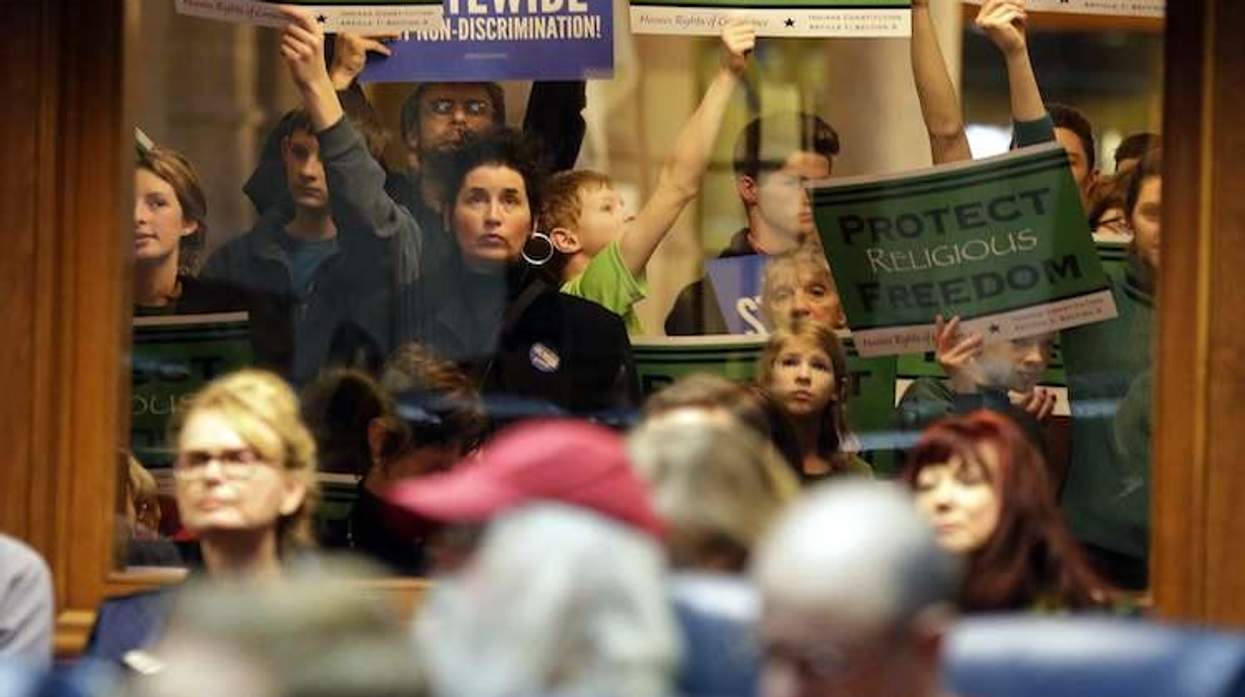An Indiana Senate committee tonight advanced what LGBT rights advocates are calling a "deeply flawed" antidiscrimination bill that would end up doing little to prevent discrimination.
After more than four hours of debate and testimony, the Senate Rules and Legislative Procedure Committee voted 7-5 to approve Senate Bill 344, which would ban discrimination based on sexual orientation but not gender identity, in employment, housing, and public accommodations, and would provide a broad exemption allowing businesses and individuals to discriminate by citing religious objections, The Indianapolis Star reports. The bill will now go to the full Senate, but when it will be considered is uncertain.
The committee OK'd amendments to the bill that would repeal last year's controversial Religious Freedom Restoration Act, including the "fix" that aimed to assure the that the law would not be a "license to discriminate" against LGBT people, but also added RFRA-like language that opponents said would facilitate discrimination. (A freestanding bill similar to the amendment died in another committee Wednesday.)
LGBT activists were quick to denounce SB 344. "Once again, Indiana lawmakers are trying to pass a bill that unacceptably leaves LGBT Hoosiers at continued risk of discrimination, and now even includes dangerous RFRA-like language attached as an amendment that strips away last year's so-called fix," Human Rights Campaign legal director Sarah Warbelow said in a press release. "SB 344 is deeply flawed across a number of areas, but most importantly, it would leave transgender Hoosiers behind. With the new amendment attached, it could now also allow anyone to wield religion as a sword of discrimination. We implore the Indiana legislature to abandon this dangerous legislation, and instead seek to pass fully inclusive nondiscrimination protections that would truly safeguard LGBT Hoosiers and visitors from discrimination."
Additional amendments to the bill would make it easier for adoption agencies, homeless shelters, and other nonprofit organizations to discriminate against LGBT people, noted Chris Paulsen, campaign manager for state LGBT rights group Freedom Indiana. The amendment would exempt groups that have a religious purpose from the law, even if they are not affiliated with a church, the Star reports.
"Lawmakers still aren't listening," Paulsen said in a prepared statement. "Tonight, they took a bad bill and made it worse for LGBT people in our state who have to live each day in fear that they could be fired, denied housing or turned away from a public place for who they are. Senate Bill 344 continues to fall far short of ending legal discrimination against LGBT people in our state. As amended, it repeals the Indiana Religious Freedom Restoration Act but replaces it with substandard protections that omit transgender people entirely and provide religious carve-outs that undermine the very purpose of the civil rights law. We will continue to work with lawmakers to fix this bill, but we are disappointed that they have not made the substantive changes we know a majority of Hoosiers want to make our state open and welcoming to all people."
The committee discussed but took no vote on Senate Bill 100, which would ban discrimination based on both sexual orientation and gender identity, but would also provide broad religious exemptions, the Star reports.
Those testifying against LGBT-inclusive antidiscrimination laws, or at least in support of religious exemptions, included two people who faced legal consequences for refusing to provide services to same-sex weddings: Washington State florist Barronelle Stutzman and Oregon bakery owner Melissa Klein. Judges have ruled that both violated their respective states' antidiscrimination laws, and both are appealing the rulings.
They both said their Christian beliefs prevented them from providing wedding-related services to same-sex couples, although they claimed they would be willing to offer services to LGBT people under other circumstances, the Star reports. "I did not turn down Rob," Stutzman said of Rob Ingersoll, a member of the couple who sued her for discrimination. "I turned down an event."
Among those testifying in support of fully inclusive antidiscrimination laws were business leaders, such as Scott McCorkle, CEO of Salesforce Marketing Cloud, and Stephen Fry, vice president for human resources at Eli Lilly. They expressed concerns about economic fallout should Indiana be seen as unwelcoming.
McCorkle said he could not support a bill without protections for transgender people, and that reviving the RFRA language would "take us back to that dark moment in Indiana history," according to the Star. Because of that, he said, "I speak to you today with grave concerns about the economic future of our state," he said.
Fry urged legislators to take a "bold step" and add sexual orientation and gender identity to Indiana's civil rights laws. Two senators, one a Democrat and one a Republican, have introduced bills to that effect, but there has been no action on either, the HRC notes.




































































Charlie Kirk DID say stoning gay people was the 'perfect law' — and these other heinous quotes